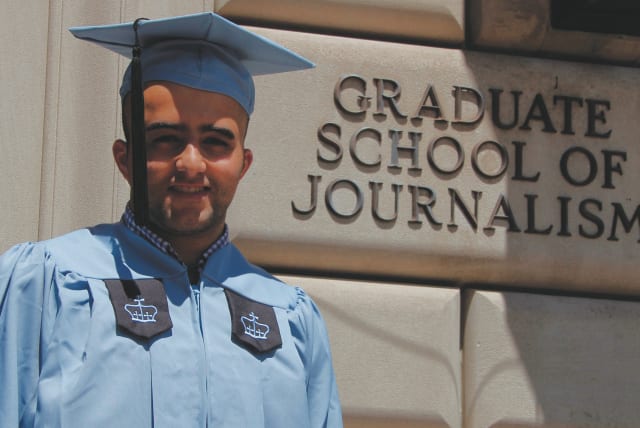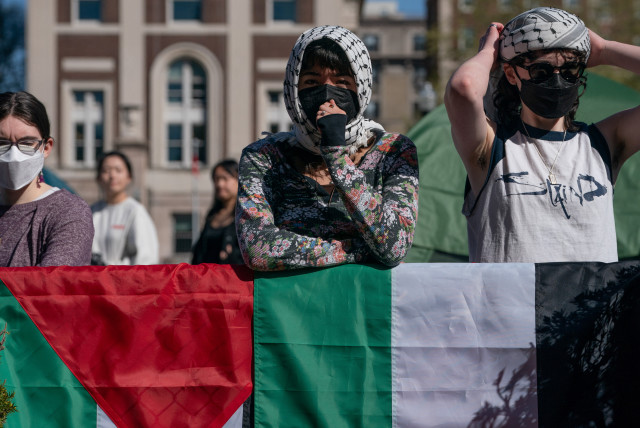Despite the protests at Columbia, I haven't completely lost faith in the university - opinion

It’s a terrifying thought that the product of the most vaunted and expensive universities in the world is hatred and staggering ignorance.
Last Wednesday, shortly after landing in Ben Gurion Airport, I met Eran, my Israeli taxi driver.
Bald, medium-build, and wearing a large, shiny Star of David necklace, he bolted from his white Toyota Corolla and offered a quintessentially Israeli grunt that sounded like “Shalom” and proceeded to load my small carry-on suitcase and laptop bag.
Before slamming shut the trunk of his car, he noticed a red tag on my carry-on bearing the words “Harvard University” and the maxim “Veritas” (Truth) inscribed across three open books on the university’s red shield. He exhaled a loud grunt before getting into the car.
Ten minutes into our ride en route to Netanya, he switched off the radio, interrupting a news segment covering the latest in Israel’s intractable hostage negotiations with Hamas, and asked me if I was ok. Noticing the bemused look on my face, he explained that he had been following the news about Jewish students no longer being safe on college campuses in the United States; and that they had been verbally and physically abused not just for supporting Israel but for simply being Jewish. And that misguided students across the US had been gleefully and unashamedly pledging support to Hezbollah and Hamas, both of which are widely recognized terrorist entities by the international community.
I explained to Eran that I was no longer a graduate student at Harvard and that I was very concerned about the welfare of Jewish students there these days and also at my other alma mater, Columbia University, at which point Eran let out an even louder gasp.
The gasp communicated more about the appalling state of affairs on college campuses today than any words would. When Israeli relatives, friends and, in this case, taxi drivers, are worrying about your safety in the United States amid a surge of antisemitism, even while they are themselves surrounded by existential threats from Hamas, Hezbollah, and even the Islamic Republic of Iran – that’s a wake-up call.
Free speech and the right to peaceful protest are vital components of a functioning democracy - one where governments and those in positions of power can rightly be held to account and where the voiceless are granted a voice. And Columbia University and Harvard, like other private universities, have stood firm by their commitment to free speech. But there is a clear difference – not just a “fine line” – between free speech and violent hate speech, intimidation and harassment.
Students have the right to peaceful protest in adherence to their college and state policies, but that can never be a pretext for Jew-hatred.
There is a clear difference between staging peaceful protests and bullying Jewish students, preventing them from attending class, spitting on them, hounding them, pinning them up against walls, and shouting that they should go back to Poland.
That’s not to say that anyone advocating for the rights of Palestinians is being antisemitic. Of course they are not. In fact, if the encampment erected on Columbia University’s South Lawn had just been pro-Palestinian, or even just pro-Palestinian and anti-Israel, there wouldn’t be such outrage.
Rabbi's message to Jewish students
However, the efforts of some of the campers advocating for Palestinian liberation have been totally overshadowed by the many documented instances of antisemitic rhetoric and actions being carried out by students and campers unaffiliated with and unauthorized to be on the campus.
The situation on Columbia’s campus had become so grave that last week an Orthodox rabbi affiliated with the school sent out a message to over 290 Jewish students warning that they should go home “as soon as possible” and not return until the “extreme antisemitism and anarchy” subsides.
It’s a terrifying thought that the product of the most vaunted and expensive universities in the world is hatred and staggering ignorance.
As Eran approached my hotel in Netanya, I reassured him that the college campus landscape stateside was not all bleak. For instance, Brandeis University, founded in 1948 by the American Jewish community in response to discriminatory policies imposed on Jewish students by other educational institutions, had extended its transfer deadline for Jewish students who felt threatened by the anti-Israel protests consuming college campuses.
I told Eran that I also haven’t lost complete faith in Columbia University or in president Minouche Shafik’s promise that the college “will not tolerate antisemitism threats, images, and other violations.”
The time to act is now. Telling Jewish students to flee and not return to campus can never be the solution.
The writer is British and based in New York City. He is the author of the forthcoming book, Unveiled: Inside Iran’s #WomenLifeFreedom Revolt, and is an alumnus of the Universities of Cambridge, Harvard, and Columbia.
Jerusalem Post Store
`; document.getElementById("linkPremium").innerHTML = cont; var divWithLink = document.getElementById("premium-link"); if (divWithLink !== null && divWithLink !== 'undefined') { divWithLink.style.border = "solid 1px #cb0f3e"; divWithLink.style.textAlign = "center"; divWithLink.style.marginBottom = "15px"; divWithLink.style.marginTop = "15px"; divWithLink.style.width = "100%"; divWithLink.style.backgroundColor = "#122952"; divWithLink.style.color = "#ffffff"; divWithLink.style.lineHeight = "1.5"; } } (function (v, i) { });

